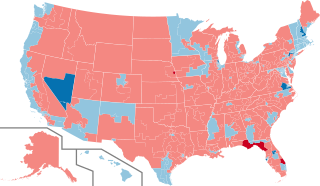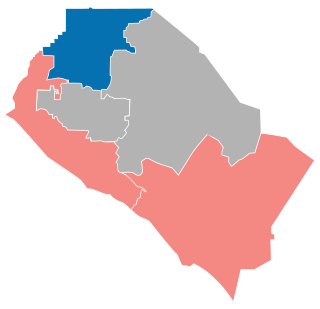
The 1848 United States presidential election was the 16th quadrennial presidential election, held on Tuesday, November 7, 1848. In the aftermath of the Mexican–American War, General Zachary Taylor of the Whig Party defeated Senator Lewis Cass of the Democratic Party.

The 1852 United States presidential election was the 17th quadrennial presidential election, held on Tuesday, November 2, 1852. Democrat Franklin Pierce defeated Whig nominee General Winfield Scott. A third party candidate from the Free Soil party, John P. Hale, also ran and came in third place, but got no electoral votes.

The 1860 United States presidential election was the 19th quadrennial presidential election, held on Tuesday, November 6, 1860. In a four-way contest, the Republican Party ticket of Abraham Lincoln and Hannibal Hamlin won a national popular plurality, a popular majority in the North where states already had abolished slavery, and a national electoral majority comprising only Northern electoral votes. Lincoln's election thus served as the main catalyst of the states that would become the Confederacy seceding from the Union. This marked the first time that a Republican was elected president. It was also the first presidential election in which both major party candidates were registered in the same home state; the others have been in 1904, 1920, 1940, 1944, and 2016.
American electoral politics have been dominated by successive pairs of major political parties since shortly after the founding of the republic of the United States. Since the 1850s, the two largest political parties have been the Democratic Party and the Republican Party—which together have won every United States presidential election since 1852 and controlled the United States Congress since at least 1856. Despite keeping the same names, the two parties have evolved in terms of ideologies, positions, and support bases over their long lifespans, in response to social, cultural, and economic developments—the Democratic Party being the left-of-center party since the time of the New Deal, and the Republican Party now being the right-of-center party.

The American Independent Party (AIP) is a political party in the United States founded in 1968. The AIP nominated former Alabama Governor George Wallace for president in the 1968 election, during which he won five states. Wallace's platform included anti-Communist and pro-"law and order" stances. The party experienced a split in 1976, resulting in the formation of the American Party and the continuation of the American Independent Party. The AIP was affiliated with the national Constitution Party from 1992 to 2008. A leadership dispute occurred within the AIP during the 2008 election cycle following its disaffiliation from the Constitution Party.

The 1844 Whig National Convention was a presidential nominating convention held on May 1, 1844, at Universalist Church in Baltimore, Maryland. It nominated the Whig Party's candidates for president and vice president in the 1844 election. The convention selected former Senator Henry Clay of Kentucky for president and former Senator Theodore Frelinghuysen of New Jersey for vice president.
A nonpartisan blanket primary is a primary election in which all candidates for the same elected office run against each other at once, regardless of the political party. Partisan elections are, on the other hand, segregated by political party. Nonpartisan blanket primaries are slightly different from most other elections systems with two rounds/a runoff, also known as "jungle primaries" , in a few ways. The first round of a nonpartisan blanket primary is officially the "primary." Round two is the "general election." Round two must be held, even if one candidate receives a majority in the first round.

The 2006 United States House of Representatives Elections in Florida took place on November 7, 2006. Elections were held in Florida's 1st through 25th congressional districts.

The Libertarian Party of Michigan is a Michigan state political party advocating a libertarian ideology and the state affiliate of the Libertarian Party of the United States. The party gained primary ballot access status in 2016 because of the vote total of presidential nominee Gary Johnson. The party lost their status since their 2018 gubernatorial nominee Bill Gelineau failed to reach that threshold in the general election.

The Republican Party of Florida (RPOF) is the affiliate of the Republican Party in the U.S. state of Florida. Florida was dominated by the Democratic Party for most of its history. The Republican Party has rapidly gained ground in recent decades. It controls the majority of Florida's U.S. House seats, both U.S. Senate seats, the governorship, and has supermajorities in both houses of the state legislature.

José Antonio Garcia Jr., known as Joe Garcia, is an American attorney and politician. Garcia represented Florida's 26th congressional district in the House of Representatives from 2013 to 2015. A Democrat, Garcia represented most of western Miami-Dade County and the Florida Keys in Congress.

The 2010 United States House of Representatives Elections in Florida were held on November 2, 2010 to determine who would represent the state of Florida in the United States House of Representatives. Representatives are elected for two-year terms; those elected served in the 112th Congress from January 2011 until January 2013. Florida had twenty-five seats in the House, apportioned according to the 2000 United States census, but would soon gain two more congressional seats in 2012.

The 2010 congressional elections in Virginia were held November 2, 2010, to determine who will represent the state of Virginia in the United States House of Representatives. Representatives are elected for two-year terms; those elected served in the 112th Congress from January 2011 until January 2013.

The Independence—Alliance Party, a merger of the Alliance Party and the Independence Party, formerly the Reform Party of Minnesota, is a political party in the U.S. state of Minnesota. It was the party of former Minnesota governor Jesse Ventura when he left the Reform Party.

The 1933 Los Angeles mayoral election took place on May 2, 1933, with a run-off election on June 6, 1933. Incumbent John Clinton Porter was defeated by Frank L. Shaw, a Los Angeles County Supervisor, in the runoff election. During the election, Shaw's citizenship was questions as his birth records could not be located.

The 2016 United States House of Representatives elections were held on November 8, 2016, to elect representatives for all 435 congressional districts across each of the 50 U.S. states to the 115th United States Congress. Non-voting members for the District of Columbia and territories of the United States were also elected. These elections coincided with the election of President Donald Trump, although his party lost seats in both chambers of Congress. The winners of this election served in the 115th Congress, with seats apportioned among the states based on the 2010 United States census. In October 2015, the House elected a new Speaker, Republican Paul Ryan, who was re-elected in the new term. Democrat Nancy Pelosi continued to lead her party as Minority Leader. Elections were also held on the same day for the U.S. Senate, many governors, and other state and local elections.

Roque "Rocky" De La Fuente Guerra is an American businessman and politician. A perennial candidate, De La Fuente was the Reform Party nominee in the 2016 and 2020 United States presidential elections. He also appeared on his own American Delta Party's presidential ticket in 2016, and on those of the Alliance Party and American Independent Party in 2020.

The 2018 United States House of Representatives elections in Virginia were held on November 6, 2018, to elect the 11 U.S. representatives from the state of Virginia, one from each of the state's 11 congressional districts. The elections coincided with other states' elections to the House of Representatives, elections to the United States Senate and various state and local elections. Primary elections took place on June 12.

Harley Edwin Rouda Jr. is an American attorney, businessman and politician who served as the U.S. representative for California's 48th congressional district from 2019 to 2021. He was the first Democrat to represent the district, which encompasses southwestern coastal portions of Orange County including the cities of Huntington Beach, Costa Mesa and Newport Beach.

The 2018 Orange County Board of Supervisors elections was on June 5, 2018 as part of the primary election on June 5, 2018. Three of the five seats of the Orange County, California Board of Supervisors were up for election.



















